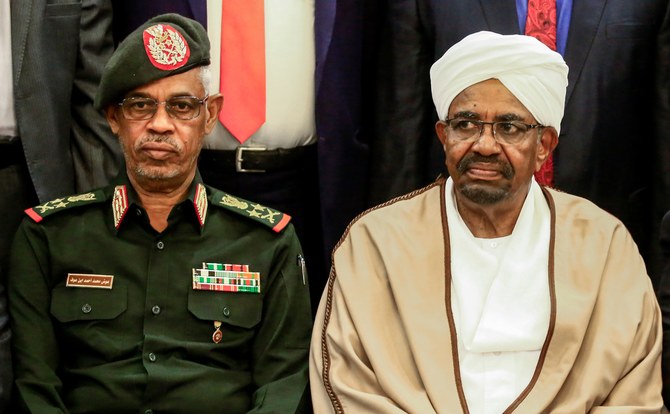CAIRO: Sudanese General Ahmed Awad Ibn Auf, who led the overthrow of veteran leader Omar Al-Bashir and has emerged as the country’s new ruler, is already under US sanctions for his alleged role in the brutal Darfur conflict.
In a somber televised statement on Thursday, Ibn Auf announced the ouster of Bashir, who ruled the northeast African country with an iron-fist for 30 years before angry protesters brought him down.
“I announce as minister of defense the toppling of the regime and detaining its chief in a secure place,” Ibn Auf said.
“We have replaced him by a transitional military council for two years and have suspended Sudan’s 2005 constitution.”
Later on Thursday state television announced that Ibn Auf had been sworn in as head of the military council triggering anger among the protesters.
“The regime has conducted a military coup by bringing back the same faces and the same institutions which our people rose up against,” the Alliance for Freedom and Change, the group that is leading the protests said in a statement.
“We call on our people to continue their sit-in in front of army headquarters and across all regions and in the streets.”
Protesters remained camped at the army headquarters in the capital for seventh straight day, vowing not to leave until the new military rulers quit.
Born in 1950, Ibn Auf, a career soldier has been a regime insider and a close aide of Al-Bashir since the former leader came to power in a coup in 1989.
Ibn Auf held several top ranking positions in the army as well as in the foreign ministry.
He rose through the ranks first to become a commander of the military’s artillery division and then to head the army intelligence wing.
In 2010 he retired but was brought back five years later as the country’s defense minister. In February Al-Bashir made him his first vice president
“Awad Ibn Auf is not only a high-ranking officer of Bashir’s old guard, but one of the few in the army to be able to maintain the cohesion between the rival branches of the regime’s security apparatus,” said Paris-based Sudan analyst, Jerome Tubiana.
Between 2010 and 2015, Ibn Auf served as a counsel in Khartoum’s embassy in Cairo and later as ambassador to Muscat.
But it is his alleged role in the conflict in Darfur that analysts say might make Western powers wary of dealing with him directly.
Analysts say Ibn Auf, a close aide of Bashir, played a key role in managing militias like the feared Janjaweed, who have been accused of committing genocide during the initial years of the conflict.
The United States put his name on its backlist of Sudanese officers sanctioned for their role in the conflict that has seen his assets blocked by the US treasury since 2007.
In May 2007, Washington said Ibn Auf has been “linked to violence, atrocities and human rights abuses” in Darfur.
Bashir himself has been indicted for alleged war crimes and genocide in the Darfur conflict, in which according to the United Nations about 300,000 people have been killed and millions displaced.
Hundreds of thousands of people still live in sprawling camps across the region.
The conflict erupted in 2003 when ethnic black rebels took up arms against Khartoum’s Arab-dominated government, accusing it of economic and political marginalization.
Ibn Auf was as “deeply involved” in the conflict as Bashir himself, said Hollywood actor George Clooney on Thursday.
“Removing the leader of a violent, corrupt system without dismantling that system is inadequate,” said Clooney, founder of The Sentry Project, which researches illicit money and war crimes in Africa.
But analyst Tubiana said the fact that Bashir agreed to go and Ibn Auf had replaced him showed that it was “a palace revolution, aimed at protecting the regime and preventing the opposition, civilians and non-Islamists ... from taking power.”
Some analysts say however that Ibn Auf might not remain for long time as head of the military council.
“He’s been taking decisions for a long time when it comes to the armed forces, but the task ahead is not going to be easy,” said an analyst.
“The anger among protesters will be a continuous challenge. For all you know he might not be there for a long time.”
Protesters vow to do exactly that.
“Ibn Auf is weak, we will ensure he quits,” said a protester without revealing his name for security reasons as he prepared for Friday prayers at the army complex.
Profile: How Ibn Auf went from regime insider to new Sudan ruler
Profile: How Ibn Auf went from regime insider to new Sudan ruler

- Born in 1950, Ibn Auf, a career soldier has been a regime insider and a close aide of Al-Bashir
- His alleged role in the conflict in Darfur might make Western powers wary of dealing with him directly
Philanthropy can unlock investment and drive global impact, says UAE’s Badr Jafar

- “The term philanthropy itself conjures up this image of the sort of billionaire donor who has lots of money to give away, and I don’t like that,” Jafar said
DAVOS: Philanthropy has the power not only to do great good, but to do so in a way that stimulates additional capital investment from business and government sources, Emirati businessman Badr Jafar told Arab News on the sidelines at the World Economic Forum in Davos.
Jafar knows a thing or two about the subject. In addition to his roles as CEO of Crescent Enterprises, a multifaceted business operating across nine sectors in 15 countries, and chairman of Gulftainer, the largest privately owned container-port operator in the world, he is special envoy for business and philanthropy for the UAE, holds multiple advisory positions in the humanitarian and development sectors and co-founded the Arab World Social Entrepreneurship Program.
“The term philanthropy itself conjures up this image of the sort of billionaire donor who has lots of money to give away, and I don’t like that,” he said.
It is problematic, Jafar said, because far from simply flinging money around in the hope that some of it sticks, many philanthropists operate in a far more sophisticated way.
“Capital today is a continuum, and impact is also a continuum,” he said.
“And the sooner we start to see the benefits of alignment of capital across government, business and philanthropy, the sooner we can start to reap the rewards that come with the multiplier effect that’s generated when these pools of capital work better together.”
Philanthropy, he said, is “the forgotten child of the capital system, regarded in some parts of the world as a peripheral player, and in other parts regarded with a high degree of suspicion.”
In fact, in its best form philanthropy can act as a catalyst: “Philanthropic capital, often referred to as catalytic capital, can help to de-risk and crowd in other sources of capital, particularly from the business sector. There are many examples from around the world where donated capital without any intended financial return goes in to unlock opportunities for businesses, including in tech.”

He also feels the sheer scale of philanthropic capital is seriously under-appreciated.
“Take the US example. The recent reductions in USAID was a shock to the system. But to put things into perspective, at its peak in about 2023 USAID was less than $50 billion a year. Now that’s a significant amount of money, but private philanthropy alone in the US in that same year — and to clarify, this is excluding corporate philanthropy — was well north of $600 billion.
“Now I’m not suggesting that private philanthropy is a substitute for official development assistance — aid from government, and the nature of aid from government, is extremely important, particularly in certain settings, including humanitarian.
“But today global philanthropy is pushing $2 trillion a year, more than three times the global humanitarian and development aid budgets, and that’s a lot of money.”
Jafar is the author of “The Business of Philanthropy: Perspectives and Insights from Global Thought Leaders on How to Change the World,” a collection of discussions with 50 of the world’s most active philanthropists, including Microsoft founder Bill Gates, the Bulgarian economist and managing director of the International Monetary Fund, Kristalina Georgieva, and Razan Al-Mubarak, head of the Environment Agency Abu Dhabi and president of the International Union for Conservation of Nature.
The title of the book, he said “was purposefully provocative, getting people to think about what the business world has to learn from philanthropy and what philanthropists have to learn from the business world.”
Through the examples, insights and experiences of his high-profile interviewees, he makes the case for what he calls “strategic philanthropy,” in the hope that others may be inspired to follow in their footsteps.
“The need for strategic philanthropy in the world today,” he writes, “is greater than ever. The geological fractures that constitute the headlines every day — regional conflicts, political extremism, and the resulting refugee and humanitarian crises — are compounded by environmental challenges.
“Public- and private-sector leaders in all countries are grappling with these issues daily. More than ever, strategic philanthropists across the world have an opportunity to step up to help meet those challenges.”
Jafar grew up in Sharjah, in a family “with a strong belief in giving back to the community.” The book is dedicated to his mother and father, “who taught me everything I know and are still working on teaching me everything they know.”
All royalties from the sale of Badr Jafar’s book are donated to the International Rescue Committee, in support of children affected by armed combat.














